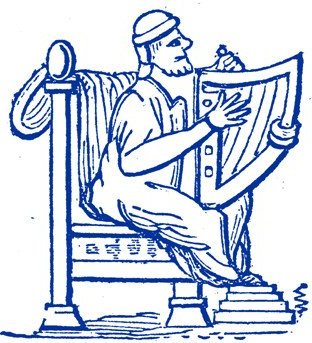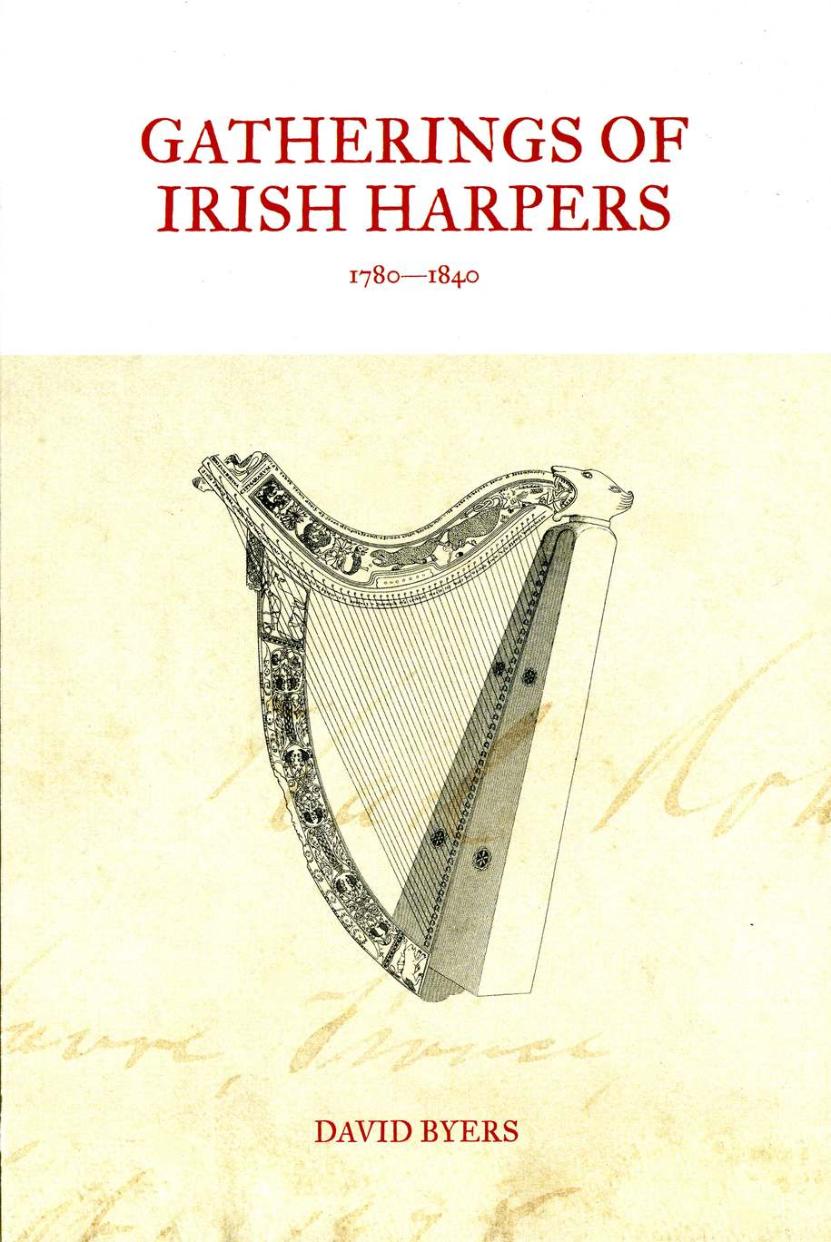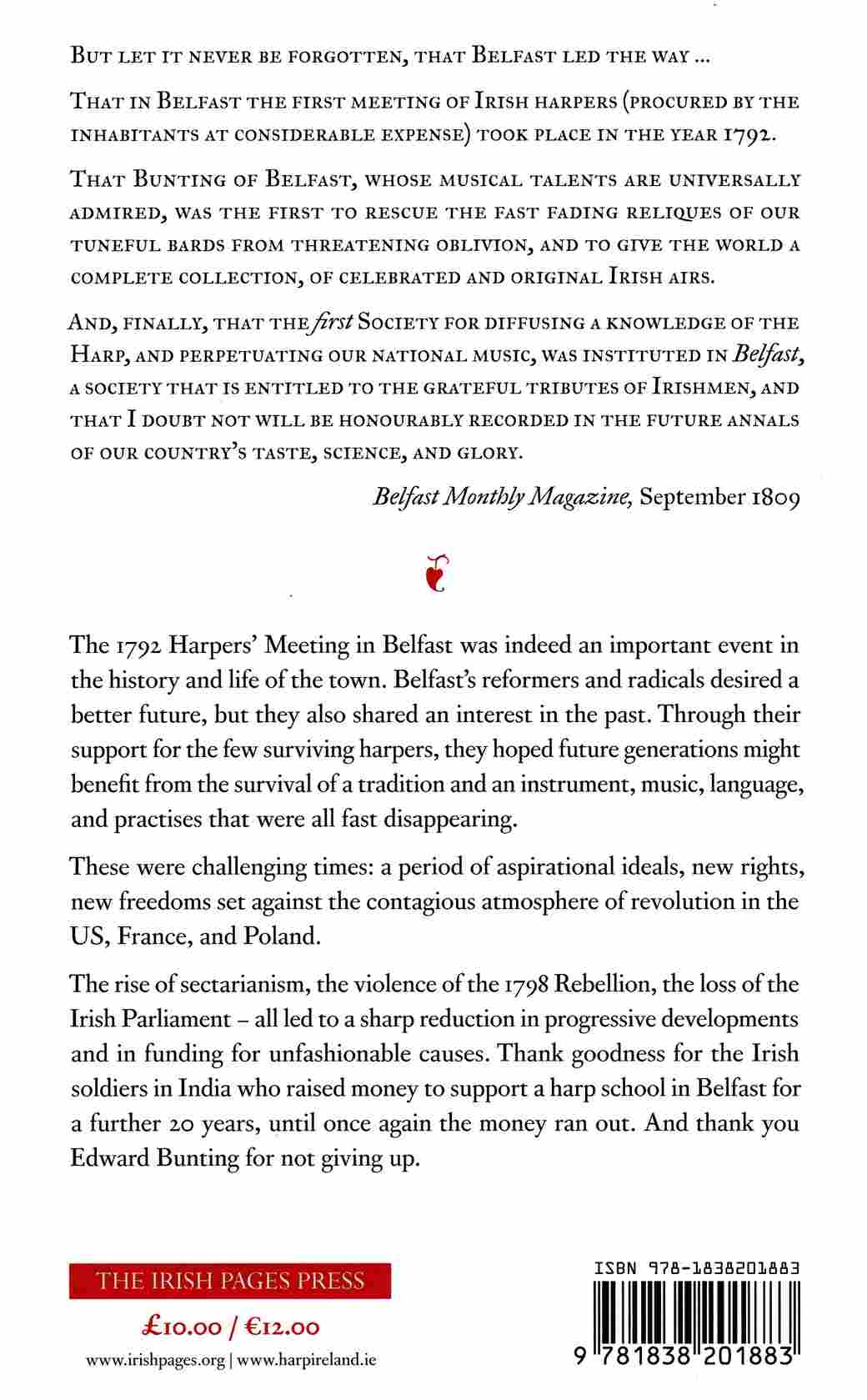
A TANGENTIAL PRELUDE
I’ve used my little medieval harper friend on the left for many decades now as a personal logo to provide a sense of brand identity.
He appears in Edward Bunting’s third and final Collection of 1840 on page 37. That’s on the first page of Chapter 3, an essay by Samuel Ferguson entitled ‘Of the antiquity of the Irish harp and bagpipe in Ireland’.
Ferguson describes my bearded friend as being from an
illuminated manuscript by Giraldus Cambrensis (Gerald de Barry)
c.1146-1223. Ferguson credits that provenance to James Robinson
Planché's History of British Costume, published in London in 1834.
Planché (1796-1880), on page 355, states that ‘Through the kindness
of Sir Thomas Phillips [sic], Bart., we are enabled to present our readers
with some contemporary drawings of the Irish costume from an invaluable
manuscript in that gentleman’s collection, which was fortunately
preserved from destruction by being sent from Bristol one day previous
to the late lamentable disturbances and conflagration: it is a copy of
Giraldus Cambrensis, illuminated about the termination of the twelfth
century ...’
Those ‘late lamentable disturbances and conflagration’ refer to the very serious October 1831 reform riots in Bristol which took three days to quell and in which much of the city centre was burnt down with over 200 casualties.
Phillipps (1792-1872) was a notorious collector of
thousands of books (40,000) and vellum manuscripts (60,000), said to be ‘the largest collection of privately owned books in the world’. He had hoped the British Museum would acquire his collection, but sadly that was not to be. It took well over a century to disperse, with parts of it sold to libraries across Europe. The remnants were finally sold
at Christie’s in London in 2006.
THE BOOK
Meanwhile (!) ... earlier this year, John Gray, former Librarian of Belfast’s historic Linen Hall Library, phoned me to commission a pamphlet based around the famous meeting of harpers in Belfast in July 1792. He was phoning on behalf of Reclaim the Enlightenment, an organisation dedicated to exploring and reviving the enlightened time in Belfast at the end of the 18th and beginning of the 19th century when idealists in Belfast (which was then described as the ‘Athens of the North’) made outstanding contributions to economic, social and political developments.
The publication, marking the 230th anniversary of the 1792 meeting, would be a contribution to the Harps Alive festival in July 2022, which I later learned was being organised in conjunction with Cruit Éireann, Harp Ireland. So the two organisations were effectively co-commissioners of the ‘pamphlet’ which grew into a small book, published by The Irish Pages Press in July 2022.
Gatherings of Irish Harpers, 1780-1840 was launched at the Linen Hall Library on 15 July 2022 by the Rt. Hon. the Lord Mayor of Belfast, Councillor Christina Black.


THE CONTENTS
The book encompasses the three annual meetings (1784-1786) of harpers held in Granard, Co Longford, complete with Balls and Suppers, set up by John Dungan, born in Granard, but now a successful businessman based in Copenhagen (correcting some misremembrances by the elderly, much esteemed harper, Arthur O’Neill, c.1809).
Thence to the famous Belfast harpers’ meeting of 1792 and recruitment of Edward Bunting, all set against the politics and parades of the time.
Plus Bunting’s first Collection of 1797; followed by two Rebellions in Ireland;
Belfast’s first Harp Society and Bunting’s second Collection of 1809*;
Belfast’s second Harp Society with funds from India;
And Bunting’s third and final Collection of 1840.
Thence to the famous Belfast harpers’ meeting of 1792 and recruitment of Edward Bunting, all set against the politics and parades of the time.
Plus Bunting’s first Collection of 1797; followed by two Rebellions in Ireland;
Belfast’s first Harp Society and Bunting’s second Collection of 1809*;
Belfast’s second Harp Society with funds from India;
And Bunting’s third and final Collection of 1840.
* See also my online essay Bunting’s Airs, Graces and Harps for the April 2022 edition of Harp Perspectives, Cruit Éireann, Harp Ireland’s online journal. Downloadable here.
CRITICAL COMMENT
From a Belfast Telegraph review by David Dunlop, Saturday 15 April 2023, Review section, page 6:
… David Byers has given us a detailed chronology of events, both musical and societal, …
Impressively researched, and containing many primary sources, he paints a vibrant picture of the early Belfast meetings of harpers and the machinations of the Belfast Harp Society in its efforts to promote Ireland’s threatened musical heritage. …
Byers’ skill in untangling the twist of politics and cultural renewal in that complex period deserves mention. Our modern tendency to binary perspective is repeatedly challenged here.
… Bunting is the hero of Byers’ piece, his obsessive energy and vision as he tried “to restore a page in the history of man” sounding clear as any harp across the intervening years.
Impressively researched, and containing many primary sources, he paints a vibrant picture of the early Belfast meetings of harpers and the machinations of the Belfast Harp Society in its efforts to promote Ireland’s threatened musical heritage. …
Byers’ skill in untangling the twist of politics and cultural renewal in that complex period deserves mention. Our modern tendency to binary perspective is repeatedly challenged here.
… Bunting is the hero of Byers’ piece, his obsessive energy and vision as he tried “to restore a page in the history of man” sounding clear as any harp across the intervening years.
To read the full review online, see here.
From a review by Keith Sanger in the West Highland Notes and Queries, Series 5, No. 11, July 2024, page 52:
... this book scores by condensing the important facts assembled from contemporary sources into one small volume.
While this must include the Irish political background of the time, it is handled with a sensitive approach and altogether makes for a useful little book for those interested in the subject.
While this must include the Irish political background of the time, it is handled with a sensitive approach and altogether makes for a useful little book for those interested in the subject.
TO ACQUIRE A COPY (or more for Christmas presents!)
In no particular order, the book may be purchased (£10 or €12, plus postage) from any of the following outlets:
It may be ordered direct from its publisher, Belfast-based The Irish Pages Press here, with UK packing and postage at £4 included in the advertised price.
In 2022, The Irish Pages Press/Cló An Mhíl Bhuí was awarded ‘The British Book Awards Small Press of the Year 2022 (Island of Ireland)’ - the first time there has been a winner from Northern Ireland in the Island of Ireland category in the British Book Awards for publishers, administered by The Bookseller magazine in London.
Reclaim the Enlightenment has established a PayPal link to order the book. See here.
It may also be ordered from Cruit Éireann, Harp Ireland (established in 2016 by harpers in collaboration with The Arts Council, An Chomhairle Ealaíon, to support the continuing evolution of the harp). Contact here or c/o Communiqué International, 26 Herbert Place, Dublin 2.
The book is on sale at An Ceathrú Póilí Bookshop, 216 Falls Rd, Belfast BT12 6AH and also online here.
Amazon Marketplace offers two sellers: Avocet and Limavady Ancestry. See here.